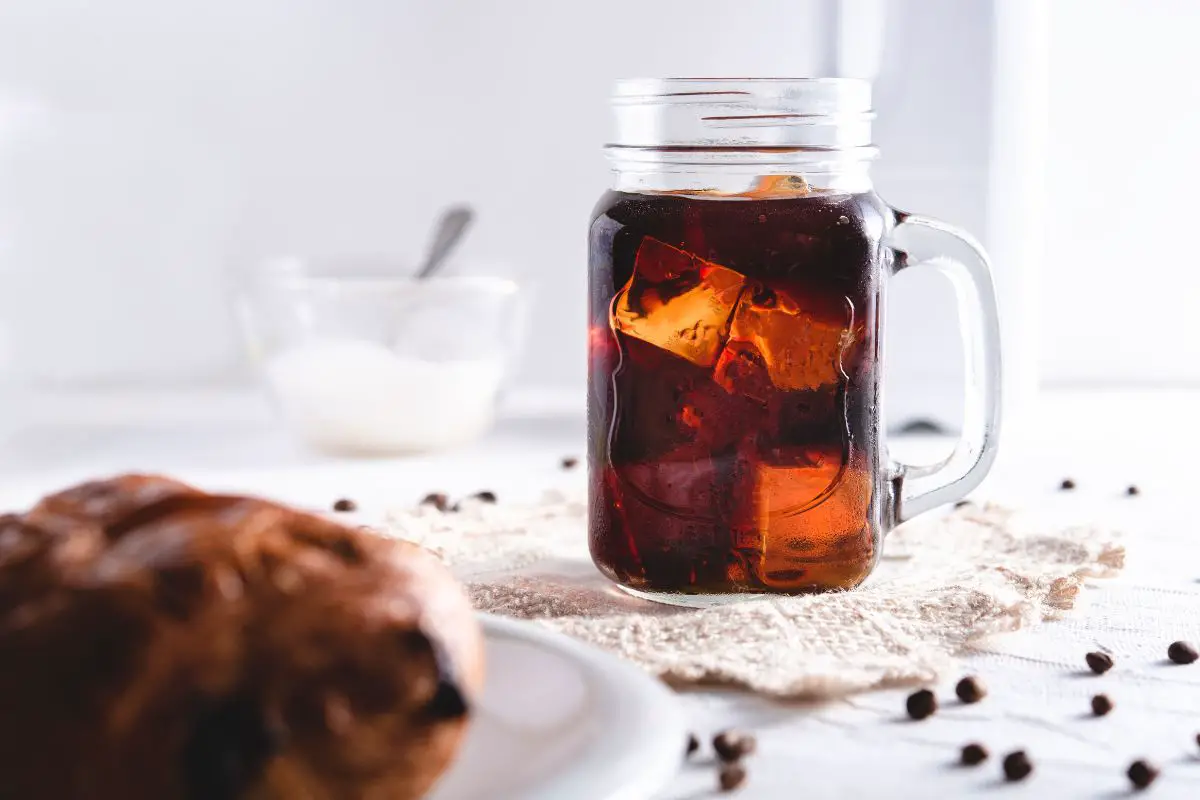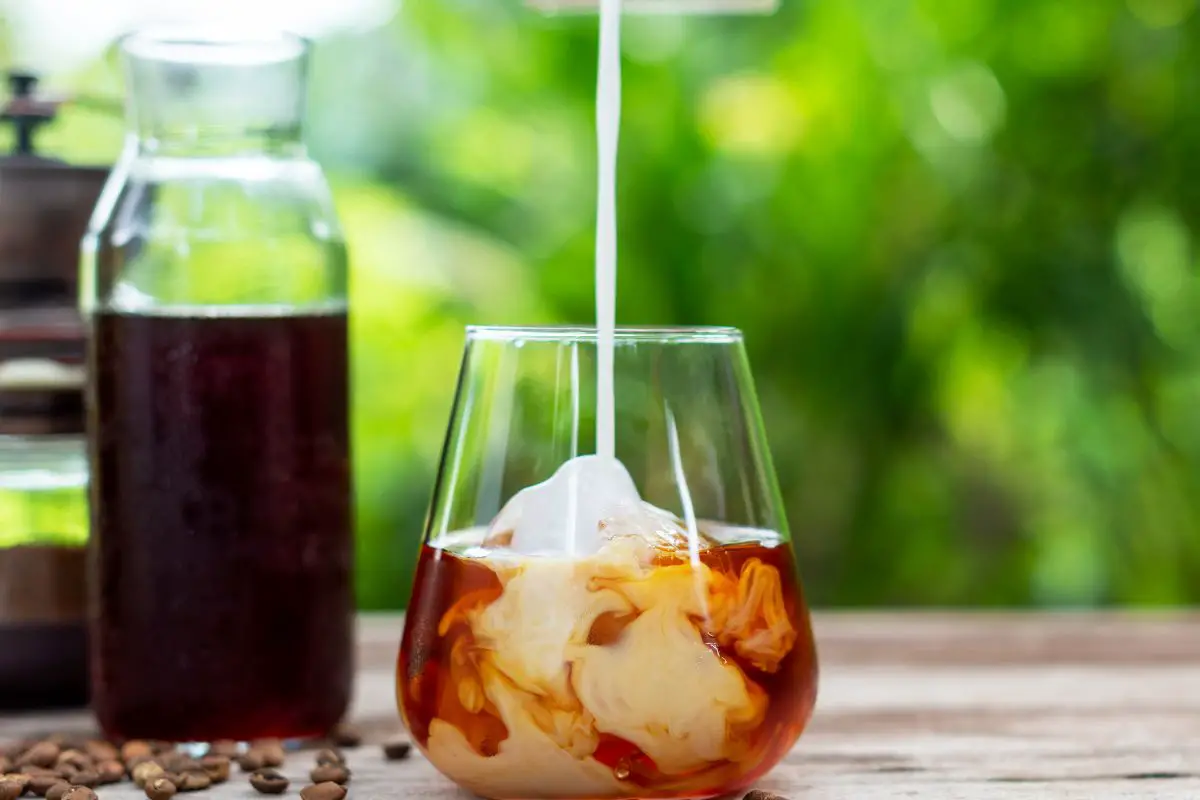As the old adage goes, ‘Safety first.’ When it comes to our beloved cold brew coffee, ensuring its freshness and quality is of utmost importance. One question that often arises is whether cold brew needs to be refrigerated.
In this article, we will delve into the science behind cold brew coffee and explore the optimal storage conditions for preserving its taste and safety.

Understanding the Basics of Cold Brew Coffee is crucial in determining its storage requirements. Cold brew is made by steeping coffee grounds in cold water for an extended period, typically 12 to 24 hours. This slow extraction process results in a smooth, low-acidity coffee concentrate that is less prone to spoilage compared to traditional hot brewed coffee.
To maintain the integrity of cold brew, it is generally recommended to refrigerate it. The cooler temperature helps inhibit the growth of bacteria and slows down the oxidation process, preserving the coffee’s flavors for a longer duration. However, alternative methods such as using airtight containers or adding preservatives can also extend the shelf life of cold brew coffee.
Ultimately, whether to refrigerate cold brew or not depends on personal preferences and the desired safety precautions. In the following sections, we will delve further into the shelf life of cold brew coffee and explore various methods for storing and preserving this beloved beverage.
Key Takeaways
- Cold brew coffee is generally recommended to be refrigerated to maintain its integrity and prevent bacterial growth.
- Proper storage conditions, such as using airtight containers or specialized coffee makers, can extend the shelf life of cold brew coffee.
- Refrigeration helps slow down oxidation and preserve the flavors and aromas of cold brew coffee.
- Storing cold brew coffee in a cool and dark place away from sunlight, heat, and moisture can also help maintain its quality.
Understanding the Basics of Cold Brew Coffee
Understanding the fundamentals of cold brew coffee entails acquiring knowledge about its basic principles and procedures. Cold brew coffee is a method of coffee preparation that involves steeping coarsely ground coffee beans in cold water for an extended period of time, typically 12 to 24 hours. The slow extraction process allows the coffee to develop a smooth and less acidic flavor profile compared to traditional hot brewed coffee.
To make cold brew coffee, the coffee grounds are usually soaked in water at a ratio of 1:4 or 1:5, depending on personal preference. The mixture is then left to steep at room temperature or in the refrigerator. After the desired steeping time, the coffee grounds are filtered out, leaving behind a concentrated coffee extract that can be diluted with water or served over ice.
It is important to note that cold brew coffee, like any other food or beverage, can spoil if not handled properly. Due to its low acidity and lack of heat during the brewing process, cold brew coffee is susceptible to bacterial growth if left at room temperature for too long. Therefore, it is recommended to refrigerate cold brew coffee to ensure its safety and extend its shelf life.
This will help prevent the growth of harmful bacteria and maintain the quality of the coffee. Moving on to the shelf life of cold brew coffee…
Shelf Life of Cold Brew Coffee
Regarding the shelf life of cold brew coffee, it is imperative to note that its longevity is contingent upon proper storage conditions.
Cold brew coffee typically has a longer shelf life compared to traditional hot brewed coffee due to its lower acidity and reduced exposure to oxygen during the brewing process.
When stored in a sealed container in the refrigerator, cold brew coffee can maintain its quality for up to two weeks. However, it is important to mention that the flavor and freshness of cold brew coffee may start to deteriorate after the first week.
To ensure the maximum shelf life of cold brew coffee, it is crucial to adhere to proper storage practices. Firstly, the coffee should be stored in an airtight container to prevent the entry of oxygen, which can accelerate the oxidation process and degrade the quality of the coffee. Additionally, the container should be stored in the refrigerator at a temperature below 40°F (4°C) to inhibit the growth of bacteria and mold.
In the subsequent section about storing cold brew coffee, we will delve into the specific steps to follow in order to ensure the optimal storage conditions for cold brew coffee, thereby prolonging its shelf life and maintaining its quality without compromising safety.
Storing Cold Brew Coffee
The proper storage of cold brew coffee is essential to maintain its quality and prolong its shelf life. When storing cold brew coffee, it is important to keep it in an airtight container to prevent exposure to air, which can lead to oxidation and loss of flavor.
Additionally, it is crucial to store cold brew coffee in a cool and dark place to avoid degradation caused by heat and light. The ideal temperature for storing cold brew coffee is between 35°F and 40°F (2°C and 4°C), which helps to inhibit the growth of bacteria and maintain its freshness.
Refrigerating cold brew coffee provides several benefits. Firstly, refrigeration slows down the oxidation process, which helps to preserve the flavors and aromas of the coffee for a longer period. It also inhibits the growth of bacteria, reducing the risk of contamination and ensuring the safety of consuming the cold brew coffee.
Furthermore, refrigeration helps to maintain a consistent temperature, preventing fluctuations that can affect the quality of the coffee. Overall, refrigerating cold brew coffee is a recommended practice to ensure its longevity and enjoy a flavorful and safe beverage.
The Benefits of Refrigerating Cold Brew Coffee
Refrigerating cold brew coffee offers several benefits, including maintaining freshness and flavor.
By storing cold brew coffee in the refrigerator, the low temperature helps to slow down the oxidation process, preserving the coffee’s taste and aroma for a longer period of time.
Additionally, refrigeration also helps to prevent bacterial growth, which can occur in room temperature environments and potentially lead to spoilage of the cold brew.
Maintaining Freshness and Flavor
To ensure optimal freshness and flavor of cold brew, proper storage methods are essential. Cold brew coffee is highly susceptible to oxidation, which can result in a stale and bitter taste. Refrigeration is a widely recommended method for maintaining the quality of cold brew. By storing cold brew in the refrigerator, the lower temperature helps slow down the oxidation process, preserving the flavors and aromas for a longer period of time. Additionally, refrigeration also helps inhibit the growth of mold and bacteria, further ensuring the safety of the cold brew. To provide a visual representation, the following table outlines the recommended storage times for refrigerated cold brew:
| Storage Time | Freshness and Flavor Quality |
|---|---|
| Up to 1 week | Excellent |
| 1-2 weeks | Very good |
| 2-3 weeks | Good |
By following these guidelines, one can prevent bacterial growth and enjoy a delicious cup of cold brew coffee.
Preventing Bacterial Growth

One effective method for ensuring the safety and quality of cold brew coffee involves implementing proper storage techniques.
Cold brew coffee is vulnerable to bacterial growth due to its low acidity and the absence of heat during the brewing process. To prevent the growth of harmful bacteria, it is crucial to store cold brew coffee in a refrigerated environment. The cold temperature inhibits the growth of bacteria, ensuring the safety of the beverage.
Additionally, storing cold brew coffee in an airtight container further prevents contamination from external sources. By maintaining a refrigerated environment and using proper storage containers, the freshness and flavor of cold brew coffee can be preserved for an extended period.
These storage techniques are essential in ensuring the safety and quality of cold brew coffee. Transitioning into the subsequent section, alternative methods for preserving cold brew coffee can also be explored.
Alternative Methods for Preserving Cold Brew Coffee
Preserving the freshness of cold brew coffee can be achieved through various alternative methods, such as utilizing airtight containers or employing specialized cold brew coffee makers. Airtight containers are effective in keeping oxygen out, which helps to prevent the oxidation process that leads to a stale taste. These containers also maintain a stable temperature, further inhibiting bacterial growth.
Specialized cold brew coffee makers, on the other hand, often come with built-in filtration systems that remove sediments and oils, enhancing the shelf life of the coffee. Additionally, some cold brew coffee makers have features like adjustable brew strength and temperature control, allowing users to customize their brewing process to prolong freshness.
In addition to these methods, it is also important to store the cold brew coffee in a cool and dark place, away from direct sunlight, heat, and moisture. These factors can accelerate the growth of bacteria and spoil the flavor of the coffee.
While these alternative methods can help preserve the freshness of cold brew coffee, it is still important to consider whether refrigeration is necessary for long-term storage.
Final Thoughts: To Refrigerate or Not to Refrigerate?

Refrigeration has long been debated as a viable method for preserving the freshness and flavor of cold brew coffee, but careful consideration of storage conditions and alternative methods may provide equally effective results. While refrigeration can slow down the deterioration process of cold brew coffee, it is not always necessary.
Here are some factors to consider when deciding whether to refrigerate cold brew:
- Temperature: Cold brew coffee should be stored in a cool place, away from direct sunlight and heat sources. If your room temperature is consistently below 70°F (21°C), refrigeration may not be necessary.
- Duration: If you plan to consume your cold brew within 24-48 hours, refrigeration is not essential. However, for longer storage, refrigerating can help maintain its flavor and freshness.
Alternative methods for preserving cold brew coffee include:
- Vacuum sealing: Removing air from the container can slow down the oxidation process and preserve the taste of cold brew.
- Bottling: Transferring cold brew into airtight bottles can help extend its shelf life by minimizing exposure to air.
Refrigeration is not always mandatory for preserving cold brew coffee. Factors such as temperature and duration of storage play a crucial role in maintaining its quality. By considering alternative methods like vacuum sealing or bottling, you can enjoy a fresh and flavorful cold brew for a longer period.
Frequently Asked Questions
Can I leave my cold brew coffee at room temperature for a few hours before refrigerating it?
It is not recommended to leave cold brew coffee at room temperature for more than 2 hours before refrigerating it. Bacteria can multiply rapidly in the warm environment, posing a safety risk. Refrigeration helps to inhibit bacterial growth and preserve the quality of the cold brew.
How long can I keep my cold brew coffee in the fridge before it goes bad?
Cold brew coffee can be stored in the refrigerator for up to two weeks before it may start to lose its flavor and freshness. It is important to properly seal the container to prevent contamination and maintain quality.
Can I freeze my cold brew coffee to extend its shelf life?
Freezing cold brew coffee can extend its shelf life, as it slows down the degradation process. However, it may affect the flavor and texture of the coffee. Proper storage in an airtight container is recommended.
Is it safe to consume cold brew coffee that has been left out overnight?
Consuming cold brew coffee that has been left out overnight is not safe due to the risk of bacterial growth. Bacteria can multiply rapidly in the warm temperature, potentially causing foodborne illnesses. Refrigeration is necessary to maintain the safety and quality of cold brew coffee.
What are the signs that my cold brew coffee has gone bad?
Signs that cold brew coffee has gone bad include a sour or off smell, a moldy or slimy appearance, and a bitter or unpleasant taste. These indicators suggest the presence of spoilage and consumption should be avoided for safety reasons.
Conclusion
In conclusion, the question of whether cold brew coffee needs to be refrigerated depends on the individual’s preference and the desired shelf life.
While refrigeration can help preserve the freshness and taste of cold brew coffee for up to two weeks, alternative methods like using airtight containers or adding preservatives can also extend its shelf life.
Interestingly, a study conducted by the National Coffee Association found that the demand for cold brew coffee increased by 580% between 2011 and 2016, indicating its growing popularity among coffee enthusiasts.
Therefore, it is essential to consider the desired shelf life and storage options when deciding whether to refrigerate cold brew coffee.
Also read: